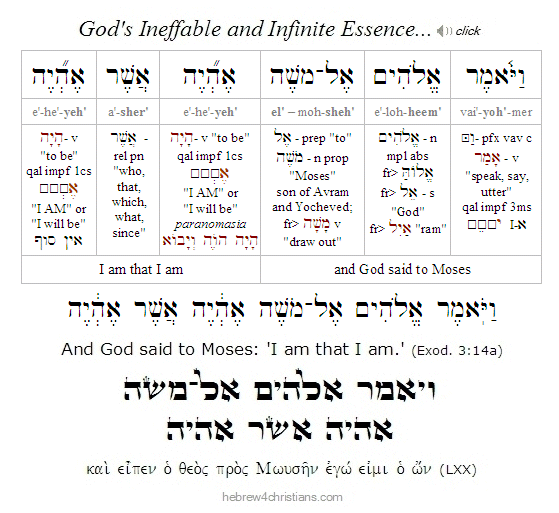|
In our Torah portion this week, Moses encountered God in the form of a Paradox – a bush that burned but was not consumed – and from the midst of this fire a Voice was heard, summoning him to lead his people out of Egypt (Exod. 3:2-4). At first Moses protested the call, offering various excuses why he was unfit for the mission, but when he finally began to relent, he asked: "If I come to the people of Israel and say to them, 'The God of your fathers has sent me to you,' and they ask me, 'What is his name?' what shall I say to them?" God's answer is mysteriously wonderful: "eheyeh asher eheyeh" (אֶהְיֶה אֲשֶׁר אֶהְיֶה). And he said, "Say this to the people of Israel, 'Eheyeh (אֶהְיֶה) has sent me to you'" (Exod 3:13-14). The sages have said that this phrase could mean "I AM who I am," or "I will be who I will be," based on the Hebrew verb hayah (הָיָה), which relates to the name YHVH (יהוה). However, since the name YHVH is not written with vowels and the transliteration is uncertain, focusing on the phonetics misses the point that God is the Source or Ground of all Being, the Sacred Essence of all that is real – the One who is and was and is to come" (Rev. 1:8). God is "ein sof" (אֵין סוֹף), the Infinite, the Unfathomable, the holy mystery of all. Every predication of existence is bound up in His power (Acts 17:28).
וַיּאמֶר אֱלהִים אֶל־משֶׁה אֶהְיֶה אֲשֶׁר אֶהְיֶה
וַיּאמֶר כּה תאמַר לִבְנֵי יִשְׂרָאֵל
אֶהְיֶה שְׁלָחַנִי אֲלֵיכֶם
vai·yoh'·mer · E·loh·heem · el · Moh·she · e·he·yeh · a·sher · e·he·yeh
vai·yoh'·mer · koh · toh·mar · leev·nei · Yees·rah·el
e·he·yeh · she·lah·cha'·nee · a·le·khem

"God said to Moses, "I AM WHO I AM."
And he said, "Say this to the sons of Israel,
'I AM has sent me to you.'" (Exod. 3:14)
Download Study Card

Hebrew Lesson
Exodus 3:14a Hebrew reading (click):
 |
The LORD (YHVH) is ultimately "unrepresentable," and therefore we are forbidden to make idols, icons, "graven images," or "likenesses" that attempt to "finitize" his reality (Exod. 20:4; Lev. 26:1). God is always greater than which you can think or imagine (Isa. 55:8-9; 64:4; 1 Cor. 2:9). Paradoxically, our language and knowledge of God is incapable of adequate correspondence, and therefore we must "see through a glass darkly," relying on analogies, allusions, figurative speech, indirect modes of communication, and so on.
Despite all this – despite our inability to fully express or represent our intuitions, experiences, dreams, and imaginations of the divine – we nevertheless can (and do) "dialog" with God in personal terms, using everyday language of the heart. Moses, for example, talked with God throughout his experience at the burning bush – both before he asks for God's name and after. Indeed, YHVH continues: "Say this to the people of Israel, 'The LORD (יהוה), the God of your fathers, the God of Abraham (אֱלהֵי אַבְרָהָם), the God of Isaac (אלהֵי יִצְחָק), and the God of Jacob (וֵאלהֵי יַעֲקב), has sent me to you.' This is my name forever (זֶה־שְּׁמִי לְעלָם), and thus I am to be remembered throughout all generations" (Exod. 3:15). In other words, though God's essence is mysteriously transcendent, and his name is "ineffable," he is immanent within human history and is revealed in the lives of the Hebrew patriarchs, in the history of the Jewish people, and in the ongoing conversation of those who are of genuine faith in Him. Indeed, even in olam haba, the world to come, the LORD God will be known in the face of Yeshua (בִּפְנֵי יֵשׁוּעַ), the anointed King of the Jews, in heavenly Zion, where the names of the tribes of Israel will all be remembered (Rev. 21:12).
Amen, despite all this "theological talk," we simply trust in the love and kindness of God revealed to us in the face and name of Yeshua, our Lord. We call God our "Abba," our Father, and we look to him to shepherd us every step of our sojourn here on earth... Regarding the question of whether we can fully apprehend the "inner meaning" of the Name of God (יהוה), we read the following vision from the New Testament: "Then I saw heaven opened, and behold, a white horse! The one sitting on it is called 'Faithful and True' (נֶאֱמָן וְיָשָׁר), and in righteousness he judges and makes war. His eyes are like a flame of fire, and on his head are many diadems, and he has a Name written that no one knows but himself (שֵׁם כָּתוּב אֲשֶׁר לא־יָדַע אִישׁ כִּי אִם־הוּא לְבַדּוֹ). He is clothed in a robe dipped in blood, and the Name by which he is called is 'the Word of God' (דְּבַר הָאֱלהִים). And the armies of heaven, arrayed in fine linen, white and pure, were following him on white horses. From His mouth comes a sharp sword with which to strike down the nations, and He will rule them with a rod of iron. And He will tread the winepress of the fierce fury of the wrath of God, the Ruler over All, the LORD God Almighty (יְהוָה אֱלהֵי צְבָאוֹת). On his robe and on his thigh he has a Name written, the King of kings (מֶלֶךְ הַמְּלָכִים) and the Lord of lords (אֲדנֵי הָאֲדנִים). And with the breath of his lips He will slay the wicked" (Rev. 19:11-16).
Notice that in this passage the LORD both has a Name that no one knows but Himself and also that is He is called 'Faithful and True,' 'the Word of God,' and so on... In other words, within Himself God's Name is something that only He can truly understand, though we can know what He is called based on the revelation and analogical language of the Scriptures.
|




